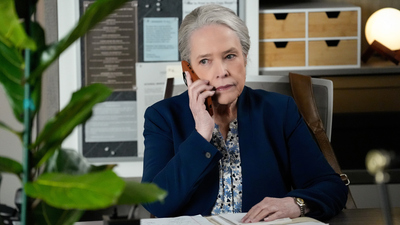
The Quiet Hum of Disappointment: Matlock Season 2 and the MD07 Whisper
There’s a particular kind of silence in the entertainment industry that speaks louder than any boisterous cancellation announcement. It’s the sound of a dream quietly deflating, a promise gently rescinded, a hope allowed to fade into the digital ether without so much as a theatrical sigh. This is the quiet hum of disappointment that has recently emanated from CBS concerning the proposed second season of their Matlock reboot, an update marked by its subtlety and identified by the enigmatic tag, “md07.”
For those of us who grew up with the folksy charm and deceptive brilliance of Andy Griffith’s Ben Matlock, the news of a modern reimagining starring the formidable Kathy Bates was a delightful curveball. It wasn’t just a nostalgic cash grab; it held the promise of a fresh, intelligent take on a beloved procedural archetype. Bates, with her unparalleled ability to embody both warmth and steely resolve, seemed a perfect fit to inherit the rumpled suit and keen eye for justice. The pilot, aired as part of the 2023-2024 season, offered a glimpse into a world where legal acumen met contemporary challenges, and the potential for a compelling new series was palpable. There was a quiet buzz, an anticipation that this wasn’t just another reboot, but a worthy successor.
Then came the “md07” update. Not a press conference, not a splashy headline across entertainment news sites, but a quieter communication, likely an internal memo or a brief, almost apologetic mention in an industry trade publication. It wasn’t an outright cancellation, which would have carried the decisive thud of a gavel. Instead, it was a deferral, a “rolling over” of the pilot, a decision to re-evaluate for the next development cycle. It’s the television equivalent of being told, “We’ll call you,” after a date that felt promising but ended with an ambiguous handshake.
The disappointment stems not from a fiery rejection, but from this very quietness, this bureaucratic limbo. It suggests a lack of emphatic enthusiasm, a network’s hesitation rather than a confident embrace. It’s the difference between a show being deemed a failure and being deemed merely “not quite there yet” – a distinction that often feels more disheartening because it lacks closure. Viewers, especially those who invested even a sliver of hope in Kathy Bates’s take on the legal eagle, are left in a state of suspended animation, unsure whether to hold onto that hope or let it gently dissipate.
This “md07” scenario is illustrative of a broader trend in an increasingly cautious and data-driven television landscape. Networks are less likely to take bold leaps, preferring to hedge their bets, especially with established intellectual property. Reboots are a double-edged sword: they offer built-in recognition but carry the immense pressure of living up to a legacy. When a pilot doesn’t immediately ignite, rather than pulling the plug definitively, the option to “roll it over” becomes a convenient, albeit frustrating, holding pattern. It allows for further tinkering, further market analysis, or simply a strategic delay to fill a future programming gap – or, more cynically, to let it quietly die on the vine.
For Matlock, this quiet deferral feels particularly poignant. It wasn’t a show designed for explosive ratings or viral moments; it was meant to be a steady, comforting presence, much like its predecessor. Kathy Bates’s Matlock promised intelligent, character-driven storytelling, a valuable antidote to the often frenetic pace of modern television. To see its future hung in such an ambiguous balance, relegated to an internal code like “md07,” feels like a disservice to its potential and to the audience who found themselves drawn to its subtle charms.
In the end, the quiet, disappointing update about Matlock season 2 and its cryptic “md07” tag serves as a microcosm of the current television climate. It’s a reminder that even projects with immense talent and genuine promise can find themselves caught in a silent bureaucratic limbo, a casualty of strategic hesitation rather than outright failure. And for the viewers, it’s a lesson in the fragility of anticipation, a quiet whisper in the digital wind that asks us to wait, to hope, but perhaps, to not hold our breath too tightly. The sound of that quiet hum of disappointment may just be the new theme song for television’s uncertain future.
